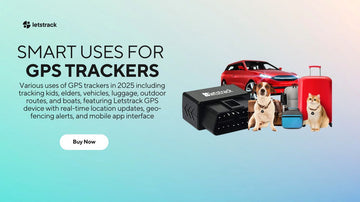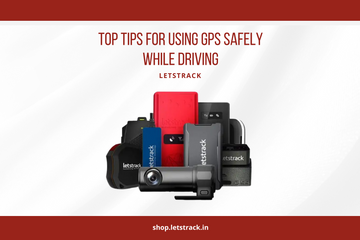In today's world, it’s difficult to envision driving without the help of GPS trackers. Whether for protecting your car, managing a fleet of vehicles, or even keeping tabs on your pets, GPS technology has become a vital tool for navigation and monitoring.
But how do these GPS trackers for vehicles function? What part does GPS technology play, and how do antennas ensure accurate tracking? In this blog, we’ll explore the fundamentals of GPS tracking, highlighting its functionality, the significance of antennas, and the different types of trackers available. By the end of this article, you’ll have a clear understanding of how GPS technology contributes to the safety and security of vehicles and fleets.
What is GPS Technology?
GPS, or Global Positioning System, is a system made up of satellites that orbit the Earth, providing accurate location information anywhere on the planet. These satellites send out signals that GPS receivers capture. By analyzing the timing of these signals, GPS devices can pinpoint their exact location. This technology has revolutionized navigation, delivering accuracy to within centimeters, whether you're looking for directions or overseeing a fleet of trucks.
How GPS Works in Vehicle Tracking
Since the 1990s, when GPS technology became widely accessible, it has become an essential part of our everyday lives, particularly in relation to driving.
As previously mentioned, GPS functions through a network of satellites. When a GPS tracking device gathers data about your location, it sends this information to a server or directly to your smartphone or computer, providing real-time tracking updates.
Whether you are a fleet manager responsible for multiple vehicles or a car owner aiming to safeguard your vehicle against theft, a car GPS tracker offers crucial insights into your car's whereabouts.
The Role of Antennas in GPS Tracking for Cars
Signal Reception
The effectiveness of a GPS tracker largely relies on the quality of the signals it receives from satellites. This is where antennas play a vital role.
A GPS antenna is specifically designed to capture signals from these satellites, which is essential for accurately determining the vehicle’s location. If the signal is weak or blocked, the tracking information may become inaccurate or delayed, leading to possible problems on the road.
Types of Antennas Used in Vehicles
Vehicles use various types of antennas for GPS tracking, each with its own benefits. Patch antennas are popular because they are small and can pick up signals from several satellites at once.
External antennas work best in situations where signals may be obstructed or weakened, like in cities with high-rise buildings or in vehicles with tinted windows. These antennas are usually installed outside the vehicle, providing a clear view of the sky and the GPS satellites.
Where Should the Antenna Be Placed?
To ensure the best GPS signal reception, the placement of the antenna is essential. It should be located in an area with a clear view of the sky, avoiding any obstructions that might block or reflect satellite signals.
Typical installation spots include the dashboard, rear deck, or even the roof of the vehicle—any location that is not covered from the sky.
How GPS Trackers for Cars Work
Signal Transmission and Reception
When you activate your car’s GPS tracker, it starts picking up signals from at least four satellites. These satellites are constantly sending out signals that contain their location and the exact time the signal was transmitted.
The GPS receiver in your car uses this data to figure out the distance to each satellite, and by employing a method known as triangulation, it determines the exact location of your vehicle.
Positioning and Triangulation
Triangulation serves as the foundation of GPS tracking. The system calculates the distance to each satellite by measuring the time it takes for signals from multiple satellites to reach the GPS receiver.
With information from at least four satellites, the GPS tracker can pinpoint the vehicle’s location in three dimensions—latitude, longitude, and altitude. This process occurs continuously, providing real-time updates on your vehicle's position.
Data Transmission
After the GPS tracker pinpoints the vehicle's location, the information needs to be sent for your access. This is usually accomplished via cellular networks or satellite communications, based on the design of the tracker.
The location data is forwarded to a central server, where it gets processed and can be accessed through mobile apps, websites, or software interfaces. Whether you're monitoring your vehicle’s position from your phone or computer, the data is consistently available, offering real-time updates.
Different Types of GPS Trackers and Antennas
There are several types of GPS trackers available, each designed to meet various needs and preferences:
-
Plug-and-Play Trackers: These trackers are simple to install and typically connect to the vehicle's OBD II port, providing a quick and easy solution.
-
Hardwired Trackers: These are installed directly into the vehicle's electrical system, making them more discreet and difficult to tamper with, which is ideal for long-term use, particularly in fleet management.
-
Battery-Powered Trackers: These portable trackers don’t need installation and are great for temporary tracking or for vehicles that lack an OBD II port.
Antenna Considerations for Each Type
The type of GPS tracker you select will determine the kind of antenna it utilizes, which in turn affects signal strength and overall performance:
-
Plug-and-Play Trackers: These generally feature internal antennas, making them compact and user-friendly, but they might struggle with signal reception in areas with limited satellite visibility.
-
Hardwired Trackers: Typically fitted with external antennas that can be positioned in optimal locations for enhanced signal reception, these offer more dependable tracking data.
-
Battery-Powered Trackers: Depending on their design, these trackers may include either internal or external antennas. While their portability is a benefit, it can lead to compromises in signal strength and battery life.
When selecting an antenna for your GPS tracker, it’s crucial to consider factors like frequency range, installation ease, size, and the ability to minimize interference for better performance.
Real-World Applications of GPS Tracking Technology
While GPS is commonly linked to navigation, it serves various other practical purposes:
Vehicle Security and Recovery
One significant benefit of using a GPS tracker in your car is improved security. If your vehicle is stolen, a GPS tracker can deliver real-time location updates, helping law enforcement recover it swiftly. Additionally, many insurance providers offer discounts for cars that have GPS tracking installed, thanks to the enhanced security it provides.
Fleet Management
GPS tracking is essential for businesses that operate fleets of vehicles. Fleet managers can monitor the location, speed, and driving habits of all vehicles at once, which boosts efficiency and cuts costs. It also facilitates better route planning and provides accurate delivery times, ultimately improving customer service.
Personal Use
For personal use, GPS trackers are great for keeping tabs on pets. With real-time location updates, you can make sure your pet is safe, especially if they tend to wander off or get lost. Many pet GPS trackers come with features like safe zone alerts, which notify you if your pet leaves a specified area.
Installing a GPS Tracker and Antenna: The Next Steps
Now that you have a grasp of how GPS trackers and antennas function, it's important to select the right device for your requirements. Understanding the fundamentals of GPS technology and the vital role antennas play in providing accurate tracking is crucial for obtaining reliable location data.
Whether you're installing a tracker for personal safety, managing a fleet, or keeping tabs on your pet, making informed decisions about devices and antennas is essential to ensure your vehicle or belongings are always accessible.
Letstrack’s experts are here to help you find the ideal solution tailored to your unique needs, ensuring you can secure your vehicle and monitor its movements effectively.


